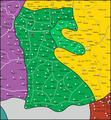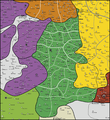Capellan Confederation
This article needs to be updated with material from Field Manual: 3085, Handbook: Major Periphery States, Objectives: Capellan Confederation, Era Report: 2750. Once these titles clear the Moratorium period, or if they already have, please consider revisiting this article and updating it with the new material. |
Property "Update Needed From" (as page type) with input value "Field Manual: 3085]], Handbook: Major Periphery States, Objectives: Capellan Confederation, [[Era Report: 2750" contains invalid characters or is incomplete and therefore can cause unexpected results during a query or annotation process.
| 200px | |
| Capellan Confederation | |
|---|---|
| Faction Profile | |
| Time period: | 2367 - present |
| Classification: | Successor State |
| Controlled systems: | ca. 217 |
| Capital world: | Sian |
| Ruler title: | Chancellor |
| Military: | Capellan Confederation Armed Forces (CCAF) |
| Secret Service: | Maskirovka |
The Capellan Confederation is the smallest and youngest of the Successor States. A socialistic police state with strong Chinese and Russian influences, the Confederation is ruled by the authoritarian Chancellor, who has almost always been a member of House Liao. During the years of the Succession Wars the Capellan Confederation was the perpetual underdog, losing territory to its aggressive neighbors and verging on the brink of total collapse before regaining much of its strength by the middle of the 31st century. Many Capellans take pride in their citizenship - not least because it must be earned - and view service to the State as a worthy sacrifice for the good of humanity. Originally founded on Capella, its current capital world is Sian.
Contents
History
This Section looks to be a Stub This section is a stub (i.e., in need of additional material). You can help us by expanding it. Please remove this tag when that effort is complete. |
Politics
The Capellan Confederation started out as a collection of states united for common defense and well-being, but over hundreds of years, through the influences of certain schools of philosophy and the leadership of House Liao, it has evolved to become an autocratic state with a controlled economy. While appearing to be nothing more than an absolute dictatorship to outsiders, the Confederation's government is closer to that of a troika, composed of three legislative bodies: the Chancellor, the Prefectorate, and the House of Scions. Each competes with the other for power, and even the strongest Chancellors have had to cooperate with the other two in order to pursue their policies.[1][2]
The Chancellor
The Chancellor is the face of the Capellan Confederation, invested with immense executive and legislative authority. The "Celestial Wisdom" is responsible for all domestic and foreign policy for the Confederation, and with the power to issue decrees can make legislative changes at will. The Chancellor serves as the commander-in-chief of the Capellan Confederation Armed Forces, and has personal control over the Warrior Houses and the Death Commandos. Although originally serving a ten-year term, the position was turned into a lifetime appointment by decree in 2480, and while not mandated by law the Chancellorship is essentially reserved for members of House Liao.[3][2]
The Prefectorate
Sometimes known as the Prefecture, the Prefectorate is the oldest and highest governing body in the Capellan state. Begun by Franco Liao as an advisory council, its members are elected from the House of Scions for ten-year terms. Originally numbering six individuals, each a representative from one of the six original commonalities, it was enlarged to twelve by Kurnath Liao to include other powerful men and women. Kurnath Liao also gave the Prefectorate certain legislative powers, although its most important function only came after the death of Duncan Liao, when the Prefectorate gained the right to designate one of its members as Chancellor.[1][4]
This right was diminished when the Chancellorship became a lifetime appointment, and severely curtailed when the Star League agreed to grant only members of House Liao a seat on the High Council, effectively limiting the Prefecture's choices. Additional restrictions came in 2598 when Chancellor Quinn issued the Decree of Succession stating that, in the event of failure to elect a new Chancellor after three formal votes, the Chancellorship will automatically be ceded to the most senior member of House Liao. Only if a member of House Liao is unavailable or not of age can the Prefectorate choose another in their place.[1][4]
Despite its diminished purpose the Prefectorate still maintains significant powers. It is responsible for passing national tax legislation, appropriations for the armed forces, and officer appointments for those military units outside the Chancellor's direct control. The Prefectorate arbitrates disputes between commonalities and, at the Chancellor's discretion, may issue decrees and rule on court decisions. It also has the power to pass "acts of ennoblement", granting certain privileges and responsibilities to individuals within the Confederation, a power it has used as a way of counteracting decrees passed by the Chancellor. Finally, all legislation passed by the Prefectorate is inviolable (except by the House of Scions) and the body cannot be removed or disbanded by the Chancellor.[1][4]
House of Scions
The House of Scions is a governing body composed of Capellan nobility, originally formed as a check on the power of the Chancellor and Prefectorate. Membership is open to both types of nobility, although the twelve-year terms are staggered to ensure constant turnover. The power of the House of Scions has ebbed and flowed through the centuries, from superficial rubber stamp to serious political force. At first the House had the power to veto legislation passed by both the Chancellor or the Prefectorate, but the right to review the Chancellor's decrees was removed by Mica Liao. During the Star League era the House gained the right to appoint new members to the Prefectorate, and after negotiations with Ilsa Liao it gained the right to determine taxes for individual commonalities, separate from the national taxes determined by the Prefecture. Like the Prefecture, any legislation passed by the House of Scions is also inviolable.[3][5]
The Ministerial
The Ministerial is the bureaucracy responsible for enacting the legislature passed by the troika, created by Chancellor Baxter as a mea culpa for the incompetence of his administration. Each Ministry is headed by a director who reports quarterly to the Prefectorate, with a first and second deputy director under them and various department coordinators, assistants and administrative staff. Originally the Ministerial was divided between the commonalities in an attempt to prevent an unacceptable concentration of bureaucratic power. However, in 3059 Chancellor Sun-Tzu Liao ended this system and relocated all ministry headquarters to the Forbidden City on Sian.[6][7]
- Ministry of Resources (Sarna) - Responsible for coordinating all scientific research and the exploitation of all natural resources within the Confederation. During the Succession Wars, this mandate was expanded to include the recovery of all lostech. Also liaised with the Word of Blake during joint research projects.
- Ministry of Information Standards (Sian) - Coordinates weights and measures, including maintaining standard time and managing Capellan currency. Its mission has long been hampered by each polity within the Confederation maintaining their own separate timekeeping standards.
- Ministry of Trade and Exchange (Capella) - Responsible for overseeing trade relations with other realms. Additional duty of administrating the peoples and resources of recently liberated worlds.
- Ministry of Development (Chesteron at Sirius) - Oversees economic development and reconstruction within the Confederation, as well as the administration of vital agricultural worlds and general promotion of food production. Receives the largest share of the Capellan budget.
- Ministry of Social Education (St. Ives) - Maintains the state's education system and charged with indoctrinating the youth to become productive citizens. A focus of (private) criticism by many in the intelligentsia caste.
- Ministry of the Military (Tikonov) - Oversees all aspects of the armed forces, including financing, procurement, and sponsoring research. Serves as liaison for mercenary units.
- Ministry of Allied Relations - Created after the formation of the Trinity Alliance, specifically responsible for interstellar relations with the Magistracy of Canopus and Taurian Concordat.
Political Divisions
The highest administrative division within the Confederation is the Commonality, each ruled by a Duke or Duchess who also serves as its representative on the Prefectorate. In the beginning, each commonality was roughly analogous to the founding states of the Confederation: the Liao Commonality, Capella Commonality, Sian Commonality, Sarna Commonality and St. Ives Commonality (a sixth, the Chesterton Commonality, existed in named only, ruled in exile on Sian by the Hargreaves family).[6][8] That number was reduced to just two after the end of the Fourth Succession War, the Capella and Sian commonalities, while the Chesterton Commonality-in-Exile was abolished in 3040 when Chancellor Romano Liao banished the Hargreaves family. However, in the years after the Clan invasion, the Confederation was able to reclaim some of its lost territory, and by 3067 it had reformed the Liao and St. Ives commonalities and created the Victoria Commonality.[8]
The commonalities are further divided into Duchies, each encompassing between two to eight star systems, ruled by a duke or duchess. Each duchy is further divided into Warrens, usually a pair of star systems, and ruled by a ducal representative known as a Diem. Individual worlds within a warren are known as Demesnes and ruled by a nobleman under the authority of the local Diem. In each case, the noble in charge of each district has the power to rule over it as their own personal fiefdom - provided they obey all Capellan laws, of course. Additionally, unless a duchy or fiefdom is hereditary in nature, the Chancellor has the power to reassign each district at will.[6][7]
Citizenship
Unlike the other Successor States where individuals are born with citizenship, in the Confederation citizenship is a benefit to be earned. All minors in the Capellan Confederation are technically wards of the state under the provisional supervision of their parents or guardians. During this time, they receive a state sponsored education and are encouraged to participate in the betterment of their communities. By age 15, each Capellan child is evaluated to determine if they have proven their commitment to the state by participating in their community, whether through outreach work or civic participation. Those who are found to have provided service to the state are granted citizenship. Those who have not are given additional education and a grace period of two years after which they will have a second evaluation. Failure to earn citizenship after one's second evaluation relegates an individual to the class of non-citizens referred to as Servitors.[9][10]
Immigrants to the Confederation must also earn their citizenship, though it may occur a number of different ways. The simplest are for foreign nobles who can pay a "relocation fee" and immediately be inducted into the ranks of the Sheng nobility, albeit at one level lower than their previous rank. Other immigrants must undergo a full educational cycle on the meaning of Capellan citizenship and perform a service to the state, typically several months of unpaid labor within their chosen profession, before being accepted. For the populations of recently liberated worlds, all individuals are immediately made servitors and required to spend no less than five years in this condition until given the opportunity to earn their citizenship.[9][10]
Capellan citizens' rights are defined by the Capellan Concordat and their privileges many: membership in the caste system, free health care and education, retirement pensions, and more. While for the most part left to their own devices, citizens also have a number of obligations: they must take an oath of loyalty to the Confederation, to House Liao and the Chancellor; when so ordered they may be relocated to another world or retrained to serve in another industry (all at the state's expense); if not a member of the armed forces or Home Guard they must register with their local militia and serve during invasions or natural disasters. Above and beyond any legal obligations, citizens are expected to continue providing services to their community throughout their lifetime, and the state makes a point of continuing to promote and rewarding those who provide selfless service to the state. In contrast, the punishment for some of the most serious crimes (treason, cowardice, ect.) results in a loss of citizenship and automatic demotion to servitor status.[9][10]
Military
The military of the Capellan Confederation is known as the Capellan Confederation Armed Forces (CCAF). Historically the CCAF has been a competent and professional military, equal to its enemies, but often hamstrung both by meddling Chancellors and trying to do too much with too little. The Chancellor serves as the commander-in-chief of the CCAF and has a seat on the Strategios, or Capellan Command Council, which in theory runs day-to-day operations of the military (though in practice this depends on the whims of the Chancellor). In a testament to House Liao's distrust of the military, the rank of General was abolished by Jasmine Liao (leaving their function in the hands of Senior Colonels) and would not be reinstated until six centuries later by Sun-Tzu Liao.
The CCAF is composed of both front-line and reserve units, as well as Home Guard and planetary militia units. Mercenary forces also play a major role in defending the Confederation, with McCarron's Armored Cavalry winning itself equal standing with the likes of other famous mercenary units. Outside the military chain-of-command and answerable only to the Chancellor are the elite Warrior Houses and Death Commandos.
Economy
Manufacturing Centers
With one of the smallest Inner Sphere economies the Capellan Confederation subsequently has had the smallest industrial base, one that was further reduced as the other states chipped away at its territory. By the end of the Third Succession War, the Confederation had just eight surviving BattleMech production facilities, in various states of repair and efficiency, producing approximately 400 'Mechs per year.[11] This number was cut in half after the Fourth Succession War and the breakaway of St. Ives and Tikonov; it wouldn't be until 3036 that the surviving 'Mech factories on Sian, Betelgeuse, Ares and Grand Base were repaired and operating at capacity.[12] While their loss was nearly a death-blow to the Capellan economy, those industries captured by the Davions continued to flourish under their rule, and with their reintegration in the latter part of the 31st century the Confederation was able to regain much of its lost strength.[13]
3067
- Heavy Aerospace Industry[14]
- Major Defense Industries[15]
- Aldis Industries
- Bergan Industries
- Ceres Metals Industries
- Earthwerks Incorporated
- Hellespont Industrials
- Hellespont 'Mech Works
- HildCo Interplanetary
- Mujika Aerospace Technologies
- Quickscell Company
- Saroyan Special Production
- Shengli Arms
- StarCorps Industries
- Tengo Aerospace
Culture & Society
This Section looks to be a Stub This section is a stub (i.e., in need of additional material). You can help us by expanding it. Please remove this tag when that effort is complete. |
Religion & Philosophy
The Capellan Confederation, more than any other state in the Inner Sphere, has largely been indifferent to all forms of organized religion. A wide segment of the Confederation, especially the worlds near Terra, still practice organized religion, and legally all citizens are allowed freedom of religion, although local politics sometimes gets in the way of this liberty. Historically, the only times when House Liao involves itself in religious matters is when there is destabilizing conflict between different sects or a religious group is deemed to be too subversive. The latter can often result in swift and indiscriminate neutralization of the problem. In a break with tradition though, Chancellor Sun-Tzu Liao began to subtly promote Buddhism as part of his Xin Sheng movement, resulting in a sharp increase in Buddhist members as many Capellans align themselves with their leader.[16][17]
However, the state does involves itself in making sure the citizenry understand the "proper philosophical attitudes" by heavily promoting a trio of philosophical texts. The Korvin Doctrine, the oldest of the state-sponsored philosophies, argues that individuals must work together for the good of "the Greater Humanity" in order to ensure its survival among the stars. The Sarna Mandate, released around the same time as the Korvin Doctrine, argues that only those with the proper training - whether in military, scientific, or political matters - are competent enough to take a leadership role. Finally the Lorix Order, authored by CCAF Major Kalvar Lorix, exemplifies the MecWarrior as the supreme combatant (and by extension the Warrior Houses) whose greatest duty is loyalty to the citizenry they protect.[18][19]
To ensure the proper philosophical outlook is taught in primary and secondary schools, Philosophical Examiners will sit in on classes and review teachers' lesson plans. If a teacher's reliability is found wanting, they will be brought before a Court of Philosophical Inquiry (composed of three Examiners, a House of Scions member and a Prefect representative) and, if found guilty, can be given any punishment without appeal. For a time there also existed the Ranks of the Dedicated, a program instituted by Maximilian Liao using young adults to inform the government of any subversive elements in society, although it was eventually discontinued by Sun-Tzu's reign.[20][21]
Era Specific Data
3145
- Fact Sheet: Capellan Confederation
- Founding Year: 2367[22][23]
- Capital (City, World): Zi-jin Cheng (Forbidden City), Sian
- National Symbol: A green arm raising a green dao sword, against a green triangle, edged in gold.
- Location (Terra relative): Rimward
- Total (Inhabited) Systems: 166
- Estimated Population (3130): 228,280,000,000
- Government: Dictatorship (Chinese feudal stylings)
- Ruler: Chancellor Daoshen (Centrella-) Liao
- Dominant Language(s): Chinese (Mandarin, official), Chinese (Cantonese), Russian, English, Hindi
- Dominant Religion(s): Buddhism, Taoism, Hindu
- Unit of Currency: Yuan (1 yuan = 0.56 C-Bills/ 1.72 C-Bills (3145)[24])
Era Maps Gallery
- CC2366.jpg
Capellan Confederation at its founding in 2366
- CC2571.jpg
Capellan Confederation after the Age of War in 2571
- CC2596.png
Capellan Confederation after the Reunification War in 2596
- CC2822.jpg
Capellan Confederation after the First Succession War in 2822
Historical Maps
after Reunification War
Star League Era
after First Succession War
- CC-2864.png
after Second Succession War
- CC-3025.png
after Third Succession War
- CC-3030.png
after Fourth Succession War
after War of 3039
beforce Clan Invasion
after Clan Invasion
in 3057
- CC-3063.png
after Operation Guerrero
- CC-3067.png
during Second Star League
during Jihad
after Jihad
in 3081
creation of the Republic of the Sphere
before Gray Monday
in 3135
in 3145
See Also
References
- ↑ 1.0 1.1 1.2 1.3 House Liao (The Capellan Confederation), p. 57
- ↑ 2.0 2.1 Handbook House Liao, p. 90
- ↑ 3.0 3.1 House Liao (The Capellan Confederation), p. 58
- ↑ 4.0 4.1 4.2 Handbook House Liao, p. 91
- ↑ Handbook House Liao, p. 93
- ↑ 6.0 6.1 6.2 House Liao (The Capellan Confederation), p. 58 Cite error: Invalid
<ref>tag; name "HLTCC59" defined multiple times with different content - ↑ 7.0 7.1 Handbook House Liao, p. 94
- ↑ 8.0 8.1 Handbook House Liao, p. 97
- ↑ 9.0 9.1 9.2 House Liao (The Capellan Confederation), p. 109-110
- ↑ 10.0 10.1 10.2 Handbook House Liao, p. 114
- ↑ House Liao (The Capellan Confederation), p. 107
- ↑ 20 Year Update, p. 60
- ↑ Handbook: House Liao, p. 130
- ↑ Strategic Operations, p. 15
- ↑ Tactical Operations
- ↑ House Liao (The Capellan Confederation), p. 63
- ↑ Handbook House Liao, p. 121
- ↑ House Liao (The Capellan Confederation), p. 64-65
- ↑ Handbook House Liao, p. 122-123
- ↑ House Liao (The Capellan Confederation), p. 66
- ↑ Handbook House Liao, p. 126
- ↑ Handbook: House Liao, p. 13, "Timeline: Capellan Zone"
- ↑ Handbook: House Liao, pp. 15-16, "Caroline's Words"
- ↑ Era Report: 3145, p.194, "Currency Conversion Table"
Bibliography
- 20-Year Update
- Binding Force
- Blood Legacy
- Bred for War
- By Temptations and By War
- Dagger Point
- Dawn of the Jihad
- Double-Blind
- Endgame
- Field Manual: Capellan Confederation
- Field Manual: Update
- Fortress Republic
- Ghost War
- Grave Covenant
- Highlander Gambit
- House Liao (The Capellan Confederation)
- Jihad Hot Spots: 3070
- Jihad Hot Spots: 3072
- The Killing Fields
- Lethal Heritage
- Lost Destiny
- Prince of Havoc
- Principles of Desolation
- Strategic Operations
- Sword of Sedition
- Tactical Operations
- Threads of Ambition
- Warrior: Coupé
- Warrior: En Garde
- Warrior: Riposte
The text in this article is based on this revision of the Wikipedia article "Capellan Confederation" used under the terms of the GNU Free Documentation License. See the BattleTechWiki's copyright notice.






















